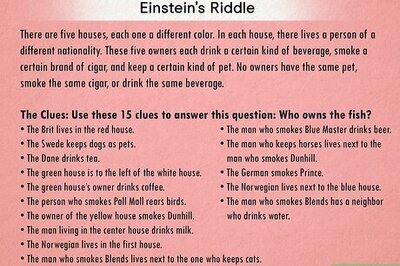
views
Scariest SCPs
SCP-2718: What Happens After SCP-2718 (which frequently has its number scrambled as part of its containment procedure) is a unique SCP. Rather than existing as a malevolent entity, 2718 is the knowledge that humans retain awareness of their existence and are able to feel pain and the decay of their physical body after they die. It is the only SCP classified as a Dammerung. Class: Dammerung Hazard type: Cognitohazard (or is it?) Containment protocol: The Dammerung’s numbers are frequently scrambled, and access to its description is restricted to prevent the existential madness that comes from contemplating “What Happens After.” Original SCP entry: SCP-2718
SCP-4666: The Yule Man The Yule Man is an evil, ancient, human-like creature that hunts snowy, remote areas for 12 days around the winter solstice—a period called the “Weissnacht Event.” Every year, 4666 stalks a family with at least one child under the age of 8, often entering their homes. On the 12th night, he either kills the family or, on occasion, lets them live but leaves gruesome gifts on the children’s beds. Class: Keter Hazard type: Biohazard Containment protocol: The Yule Man can teleport and can not be contained during a Weissnacht Event. Original SCP entry: SCP-4666
SCP-001: When Day Breaks SCP-001 is an apocalyptic anomaly that causes the sun’s rays to melt all of the living things on earth. Humans are either killed or transformed into zombie-like globs known collectively as SCP-001-A. SCP-001-A searches out remaining humans, dragging them into the sunlight to add them to the hoard. Class: Keter Hazard type: XK-Δ-Class "Solar Singularity" Scenario Containment protocol: SCP-001 is an anomaly that can not be contained. Original SCP entry: SPC-001
SCP-106: The Old Man SCP-106 is a humanoid entity that looks like a decomposing old man. 106 can drag victims into a pocket dimension, where he tortures and typically kills them. He can scale walls and also has a corrosive ability, causing people or objects to disintegrate when he touches them. Class: Keter Hazard type: Corrosive biohazard Containment protocol: SCP-106 must be contained in a sealed container made of at least 40 layers of lead-lined steel. The container must be suspended by means of electromagnets. The containment chamber should be concealed within at least 16 outer cells. Original SCP entry: SCP-106
SCP-729-J: Peep Peep M----------r SCP-729-J looks like a plush bunny, specifically like a yellow marshmallow Peep candy. It’s sheer existence is terrifying to everyone, including other SCPs—SCP 106 (above) is said to have voluntarily re-entered his containment cell after encountering it. The only entity that isn’t afraid of 729-J is SCP’s Head of Research and Containment Dr. Niles Hessen. Class: Thaumiel (Formerly Keter) Hazard type: -J anomaly Containment protocol: 729-J currently sits on Dr. Hessen’s desk, to the horror of anyone who enters her office. Original SCP entry: SCP-729-J
SCP-096: Shy Guy SCP-096 is a tall, thin humanoid SCP with extremely long arms. He’s normally docile, but if someone sees his face, he will pursue the person relentlessly. When he catches them, he will scream and violently kill the person, then return to his calm state. Class: Euclid Hazard type: Visual cognitohazard Containment protocol: SCP-096 must be kept in an airtight square cube. Cameras and other visual inspections must not be used to verify his containment site—pressurized sensors are used instead. Original SCP entry: SCP-096
SCP-3000: Anantashesha / The Eel SCP-3000 is a massive eel- or serpent-like creature that lives in the Bay of Bengal. It’s thought to be up to 600–900 km (370–560 mi) long and typically only moves its head. Simply viewing 3000 can cause cognitive disruptions like amnesia, paranoia, and panic. Class: Thaumiel Hazard type: Cognitohazard Containment protocol: The SCP Foundation routinely patrols the Bay where SCP-3000 resides. 3000 secretes a substance with amnestic properties known as Y-909. The Foundation feeds 3000 human victims, then collects Y-909 for “scientific” purposes. Original SCP entry: SCP-3000
SCP-3001: Red Reality SCP-3001 is the space that exists between dimensions. Anything in this non-dimension exists in a state of non-reality, and physical matter will gradually begin to degrade—but the consciousness remains intact. Dr. Rober Scranton, Head Researcher at the SCP Foundation, was trapped in the Red Reality, where he recorded his experiences. He has not been retrieved. Class: Euclid Hazard type: Void Containment protocol: Non-dimensions can not be contained. Original SCP entry: SCP-3001
SCP-087: The Stairwell SCP-087 is a descending stairwell found on a school campus (its exact location is redacted in the file). Witnesses report the sound of a child crying from the bottom of the staircase, which can not be seen from the top. The staircase seems to extend infinitely; explorations by the Foundation have not been able to locate the bottom. Class: Euclid Hazard type: Hostile environment; acoustic threat Containment protocol: The staircase is hidden behind a locked door that can only be opened by applying a specific (redacted) amount of electricity while simultaneously turning the key counter-clockwise. The door is padded with foam. Original SCP entry: SCP-087
SCP-610: The Flesh That Hates SCP-610 is an aggressively contagious disease that spreads through physical contact with the infected. Initial symptoms include an itchy rash and skin sensitivity, but this quickly develops into scar-like tissue that overtakes the host within hours. Although this proves fatal, the host reanimates within minutes, morphing into an unrecognizable entity that attempts to infect anything living. Class: Keter Hazard type: Biohazard Containment protocol: The only effective containment so far has been to establish a perimeter around the known area of infection. Original SCP entry: SCP-610
SCP-3125: Synopsis SCP-3125 is an entity from the Fifth Dimension. As it spreads, it takes over human thought, replacing it with a new consciousness. Anyone affected by 3125 ceases to be recognizably human, and it’s thought that this will eventually lead to an apocalyptic destruction of humanity. Class: Keter Hazard type: Cognitohazard Containment protocol: Officially, this SCP is contained in the SCP Foundation’s Cognitohazard Containment Unit, inside a soundproof, lead-lined room. Anyone who enters the room must be flushed with amnestic gas for 3 minutes immediately upon exiting. Original SCP entry: SCP-3125
SCP-5000: Absolute Exclusion Harness / The Entity SCP-5000 is a mechanical suit that protects the wearer. The threat in the SCP-5000 files is not the actual suit, but the revelation that humanity has been impacted by a parasitic plague known as The Entity, or SCP-5000-Δ. Class: Safe / Apollyon Hazard type: Cognitohazard Containment protocol: SCP-5000 is currently deactivated and held in storage by the SCP Foundation. SCP-5000-Δ can not be contained. Original SCP entry: SCP-5000
SCP-7179: E is for Eternity SCP-7179 is a collection of extra-dimensional islands where people go after they die. Although these instances initially seem like an idyllic afterlife, inhabitants discover that eternal repetition and endless daylight actually make this a bleak reality. Class: Safe Hazard type: Psychological/existential hazard Containment protocol: SCP-7179 can not be contained; furthermore, it is assumed that all human consciousness ends up here after death. Original SCP entry: SCP-7179
SCP-049: The Plague Doctor SCP-049 is a humanoid creature that looks like the beaked plague masks worn by physicians in the 1600s. This SCP believes he is called to eradicate a plague known as the “Pestilence” and will kill any humans believed to be infected with this disease. His victims’ corpses then become reanimated (SCP-049-2). Class: Euclid Hazard type: Biological Containment protocol: SCP-049 is currently contained by the SCP Foundation, where he generally remains compliant. The scent of lavender is effective at calming him during outbursts. Original SCP entry: SCP-049
SCP-173: The Sculpture / The Peanut SCP-173 is an animated statue made of concrete, rebar, and spray paint. It has a round, peanut-like shape with stubby arms and legs. It only moves when no one is looking at it—but it moves incredibly fast. Even a blink can be enough time for it to reach its victims. Class: Euclid Hazard type: Physical Containment protocol: SCP-173 is currently contained by the SCP Foundation. At least 3 personnel must be present to enter its container, and at least 2 must maintain direct eye contact with the sculpture at all times. Original SCP entry: SCP-173
SCP-682: Hard-to-Destroy Reptile SCP-682 is an enormous, intelligent reptile-like entity. It detests any living being, including plants, animals, and people. As its name suggests, 682 is extraordinarily difficult to injure or kill—it regenerates no matter how much damage it is subjected to. It may also pose a cognitohazard, prompting those affected to be consumed by the desire to destroy 682. Class: Keter Hazard type: Physical, possibly cognitohazard Containment protocol: SCP-682 is contained in a chamber filled with hydrochloric acid, but it frequently attempts to escape containment (sometimes successfully) Original SCP entry: SCP-682
SCP-3515: Unearth SCP-3515 seems innocent enough at first—it’s a charcoal drawing of a willow tree. But if someone spends more than an hour around the painting, they’ll begin to have auditory hallucinations that sound like digging. And if they should happen to fall asleep near it, they’ll wake up inside a pocket dimension that looks like their childhood home, except the building is covered with dirt. No matter how much they dig, they can’t escape. Class: Safe Hazard type: Psychological/existential Containment protocol: SCP-3515 is stored in an art locker owned by the SCP Foundation at a predetermined distance from on-site sleeping quarters. Original SCP entry: SCP-3515
What are the classes of SCP?
The 3 most common classes are Safe, Euclid, and Keter. This refers to how easy or difficult the anomaly is to contain—not necessarily the actual danger it may pose to humans when it is outside of containment. Here’s what each class means: Safe: Easy to contain, few resources required to maintain containment Euclid: Complex containment, sometimes unreliable Keter: Difficult to maintain consistent containment Thaumiel: Used to contain other SCPs Apollyon: Can not be contained
Are SCPs real?
No, SCPs are a fictional creative writing project. It was created by a community of writers. The website clearly states that SCPs are not real, and writers are encouraged not to remain in-character when they comment or chat on the site. That said, some writers may draw on real legends for their work. For instance, SCP-1000 is based on Bigfoot and SCP-3000 is based on the serpent Ananta Shesha from Hindu mythology.
What is the SCP Foundation?
The SCP Foundation is an organization that contains SCP anomalies. The SCP Foundation is a fictional secret society. It’s responsible for researching, identifying, locating, and capturing or eradicating dangerous SCP phenomena that would otherwise disrupt human existence. SCP stands for both “Secure, Contain, Protect”—the SCP Foundation’s mission—and “Special Containment Procedures.”

















Comments
0 comment